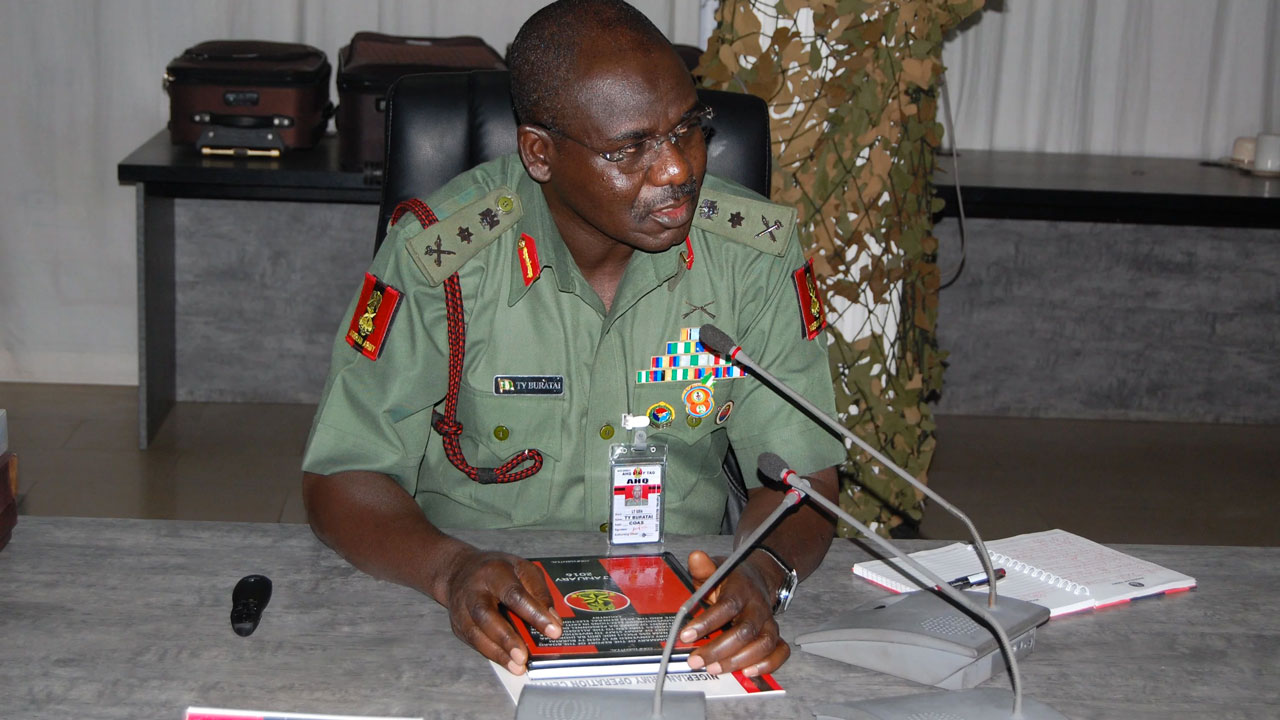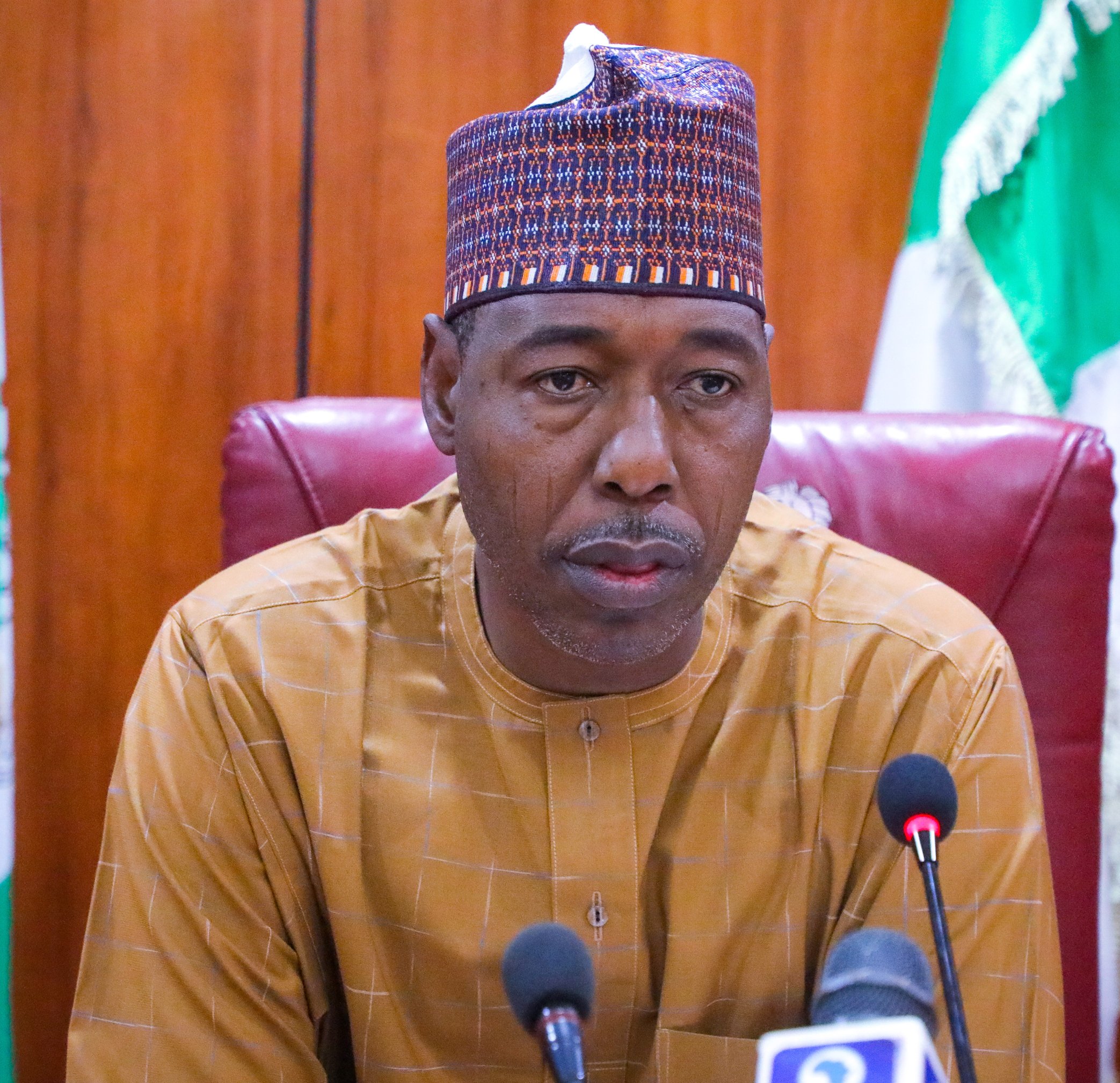By Okanga Agila
Often times, I hear Nigerians refer to the Chief of Army Staff (COAS) and leader of the counter insurgency operations in Nigeria, Lt. Gen. Tukur Yusufu Buratai as the digital Army Chief. This epaulet on the COAS is not fancy, but a true reflection of the leadership qualities and competence of a soldier who is transformative and visionary.
Since his appointment in July 2015, Gen. Buratai has never relented on his oars to restructure, reorganize and reposition the Nigeria Army (NA) which will be a pride to the military and the nation. He has never concealed his contempt and disdain for the poor shape and status of the Army he met, which was peopled by unprofessional, undisciplined, disloyal and unpatriotic personnel. Nigeria had soldiers who were uncommitted and irresponsible. They flinched at the battlefield regrettably.
Gen. Buratai instantly promised to change the narrative. His mission in leading the NA has been to re-organize and restructure the Army institution in a manner that would make it responsible and responsive to the national security challenges confronting the nation. And rewinding yesterday, it is easy to see clearly the impact of Gen. Buratai’s leadership of the NA as manifest in reforms and innovations as confirmed by the performance of Army personnel on national assignments.
The Army Chief knew that the excellence of soldiers is only determined by constant training, knowledge update and exposure to latest technology in warfare. I saw his interest in establishing special schools for the NA and upgrading facilities in existing ones as the pursuit of this agenda. The Nigerian Army Aviation School and the Nigeria Army University, Biu (NAUB) are some of the practical statements the Army boss has made on his passion for the country to have a properly trained Army personnel.
With the manner Nigeria was pleasurably celebrated in degeneration before the Buhari Presidency, it never struck me that the narrative will change this soon to have the Nigerian Army School of Artillery revived to now manufacture weapons. The school functioned only in name, but I was amazed to understand, the school now source materials locally to manufacture some of the weapons troops use in the ongoing counter-insurgency operations in the Northeast and elsewhere in Nigeria.
This is the expectation of President Muhammadu Buhari when he opted for the choice of Gen. Buratai as COAS. The Army boss has also changed the tradition of de-prioritizing the welfare of troops. Salaries and allowances are paid promptly. Army barracks or formations around the country have gone renovations as part of Buratai’s bargain for decent accommodation for Army personnel.
And I noticed that among the three arms of the Nigerian military, the Nigerian Army was first to get its Account Department to key into the Federal Government’s policy of Treasury Single Account (TSA) and the Integrated Personnel Payment System (IPPS) to enhance quick and easy computation of salaries, ensure transparency and eliminate any possible fraud in the preparation of emoluments of NA personnel.
Gen. Buratai has impresses me as a leader. At no point that he feels satisfied with his performance. His crave to improve on the existing standards he has attained is infectious. He appraises the NA constantly and sets targets for himself. At the 2017 Chief of Army Staff Conference, Gen. Buratai explained his mindset;
“The Conference provides an opportunity for the Nigerian Army to appraise training and operations activities as well as logistics and administrative matters. The Nigerian Army also wishes to use the conference to reflect on its performances in 2017 in order to make projections for 2018. This is with a view to consolidating on the successes so far achieved in repositioning the NA for better performance in the discharge of its constitutional roles. These would be based on the lessons drawn from the activities of the year ending in pursuance of the NA’s responsibilities of maintaining and defending the territorial integrity of Nigeria.”
That the Islamic State West Africa Province (Boko Haram) has been unable to retake the territories the Army under Buratai’s leadership reclaimed in the Northeast is indication that the NA reviews its strategies and tactics in the battle against insurgents frequently. Insurgents have tried hard to break new grounds, but they are checkmated by Nigerian troops.
It is easy for a leader to have a vision, but to surmount all encumbrances to transform the vision into reality is the biggest challenge for most leaders. It is what makes the difference and Gen. Buratai is gifted in both ways. His initiative of deploying technological innovations like the use of drones and the Unmanned Ariel Vehicles (UAV) in the battle against Boko Haram terrorists exposes the extent he has improved on Nigeria’s technology-based warfare.
The Army Chief understands and appreciates the importance of technology in crime prevention and he has exposed the Nigeria Army to its multiple benefits. So, months back, Gen. Buratai launched digitized uniforms in the Army. It is capable of transmitting signals if the user in distress or danger.
The Army boss explained that the uniform is technology-based, it is tagged with sensors anywhere a troop has found himself and it sends a signal when he or she is in danger. It is very significant in ensuring the safety of troops in warfare. We can only appreciate the Army leadership for the uniforms, which is an expression of the desire to protect troops fighting insurgency in the rough and complex terrains of the Northeast.
The foresight of the COAS to understand that terrorism war is fought on the battlefields, much as it is tackled in the media points to his ingenuity. When he initially led the war assaults against terrorists, their sympathizers’ and agents stepped up propaganda about fake supremacy in the battle against Nigerian forces. They churned out fake and crafted news reports to embolden Boko Haram commanders and their foot soldiers.
I know, cyberspace terrorism became pronounced in the war on terror in 2016 and it was clear insurgents’ were suffering unimaginable defeat in the battle due to the superiority and might of Nigerian troops. That was the time Boko Haram’s seized territories in the Northeast were being gradually reclaimed and hundreds of Nigerians, mostly women and children held in the captivity of insurgents in different locations had their freedom secured by soldiers.
Therefore, Gen. Buratai deployed his talents on cyberspace terrorism to subdue the enemies of state or terrorists. First, he reorganized the Directorate of Army Public Relations (DAPR) and equipped it with modern communication gadgets. And he appointed capable hands to manage information dissemination especially on the Boko Haram combat wars. Proactive steps were adopted in countering terrorists’ propaganda and official confirmation of news on the counter-insurgency operations was consistent.
The Army’s increased presence in the media with information on terrorism combat operations to Nigerians and the world clipped the wings of terrorists and the veiled agents. The impact was so tremendous that former American Secretary of States, Mr. Rex Tillerson commended Gen. Buratai over his cyberspace terrorism affront. He pleaded with other nations under the menace of terrorism to emulate the Nigerian example, elucidating that cyberspace terrorism is also a very potent aspect of the war on terror and has dire consequences.
And for the first time, the NA operated an Army Situation Room when they were directed by the President to embark on election duty in providing additional security for a peaceful general election in 2019. Gen. Buratai explained that the essence of the Army Situation Room was to monitor flashpoints of violence, easily detect them and rapidly respond to the emergency.
Under Gen. Buratai, the NA has romanced Military/Civil relations on a different mutual plane. The Army has launched its Corporate Social Responsibility (CSR) by devoting part of its approved budgets to execute community-based projects in water, electricity, healthcare, and roads construction among others. The natives of Abakpa community in Enugu state, whom the Army supplied portable and hygienic drinking water can attest to Nigerian soldiers’ new orientation and thinking.
Similarly, the NA has been almost the sole factor in opening up Sambisa forest and its environs after the demystification of the hitherto much dreaded forest which was terrorists most secured haven. NA has either rehabilitated or constructed new roads and provided other social amenities in the area. These are the various ways the NA under Gen. Buratai is proving that it is a responsible institution to its country and the people in the 21st century.
As part of the reorganization effort, the Nigerian Army under Gen. Buratai has established two focal departments I consider necessary in projecting and propelling its competence and also, renew its inclination to respect the human rights and dignity of Nigerians. So, Buratai deemed it necessary to establish the transformation and innovation department to drive the new initiatives.
It is designed to serve as the springboard for research and developments on army equipment, scientific and technological innovations that could be harnessed to support the Army in the arduous task of combating insurgencies and insurrections in the country.
The Human Rights Desk (HRD) at the Nigerian Army Headquarters’ (AHQs) and Army Divisions are conceptualize to provide answers and solace to occasional cases of professional misconduct arising from abuse of the human rights of Nigerians in the course of military operations.
And in further pursuit of this agenda, NA personnel have been conditioned or orientated to know that where they infringe on the rights and dignity of Nigerians, they will respond to court summons against them and answer to the allegations in a court of law. It is a remarkable departure from the tradition of the past where it was impossible to approach any Army formation to serve them court summons.
In spite of these lofty heights, Gen. Buratai thinks, its not time to relax. He recently assured Nigerians that “Let me at this point state that the NA will continue to uphold its core values of loyalty, courage, professionalism, discipline, respect and sacrifice. Our loyalty to the Constitution of the Federal Republic of Nigeria remains sacrosanct in the interest of a united and prosperous Nigeria.”
I believe the narrative has changed for the good since Gen. Buratai stepped on the podium. And this is affirmed by the improvements we can see and feel on security around the country, despite the deliberately orchestrated drums of war. But whatever has been done to sabotage the efforts on security, it has not blurred the positive differences and winning streaks of the COAS, Gen. Buratai.
President Buhari confirmed it in his June 12 2019 Democracy Day speech. He reminds Nigerians that “When I took the oath of office on 29 May 2015, insecurity reigned. Apart from occupying 18 local governments in the North East, Boko Haram could at will attack any city including the Federal Capital, could threaten any institution including bombing the United Nations building and Police Headquarters in Abuja.”
“Admittedly, some of the challenges still remain in kidnappings and banditry in some rural areas. The great difference between 2015 and today is that we are meeting these challenges with much greater support to the security forces in terms of money, equipment and improved local intelligence. We are meeting these challenges with superior strategy, firepower and resolve.”
Okanga wrote from Agila, Benue State.











